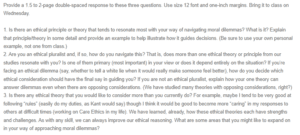The Beneficence Principle in Medical Ethics
Working in the healthcare landscape, especially in the medical field, exposes one to many moral dilemmas. There are multiple ethical principles and theoretical frameworks that guide practitioners in getting through these ethical challenges in practice. I usually refer to the ethical principles in healthcare when faced with ethical dilemmas. The ethical principle that resonates most with my way of navigating moral dilemmas is the ethical principle of beneficence. Beneficence is the basic and foundational ethical principle in medical practice (Bester, 2020). From a general perspective, beneficence is acting without any obligatory moral ideals or conditions. That is, acting in a human and unconditional manner. In medical practice settings, it means providing the best care for the benefit of a patient’s well-being and promoting and protecting their health interests (Bester, 2020). Through this understanding, my focus is on achieving the best outcomes regardless of the moral dilemmas I face during practice. For instance, during my practice, I once was assigned to the emergency department (ER); I received a patient who had been involved in a car accident and lost a lot of blood. According to a family member, their religion does not allow a person to transfuse blood. Since the patient was incapacitated to make any decisions himself, this created an ethical challenge. Based on the beneficence principle to do the best of my ability to maximize the best possible outcomes, I explained to the relative why the blood transfusion was necessary for him to stay alive. We eventually came to an understanding, and the patient received the much-needed blood transfusion that saved his life.
I am an ethical pluralist. Although beneficence is my primary ethical principle, I also consider the principles of autonomy and justice and Jean Watson’s theory of human caring in my decision-making if faced with moral dilemmas, regardless of the situation. With beneficence as the primary ethical principle, I understand that regardless of how much I am obligated to ensure the patient has the best care, I must respect their autonomy in all care decisions. I provide enough information regarding their health situation and care options to help them make informed decisions. Secondly, the justice principles guide me to provide impartial patient care regardless of a patient’s age, race, economic status, religion, and other distinguishing factors. I consider Jean Watson’s theory of human caring because it reminds me that caring and promoting better health care is central to nursing (Sitzman & Watson, 2018).
A theory I would like to explore and consider more than I currently do is Jean Watson’s theory of human caring. I am really good at caring for others and considering their perspectives, but I am not good at developing personal relationships with my patients. Based on research evidence, the patient-provider relationship is critical in improving care outcomes.(Olaisen et al., 2020). Jean Watson’s theory of human caring emphasizes transpersonal care through the development of helping-trusting relationships. I believe developing interpersonal caring relationships can improve my ability to deliver more ethical and patient-centered care.
References
Bester, J. C. (2020). Beneficence, interests, and wellbeing in medicine: What it means to provide benefit to patients. The American Journal of Bioethics : AJOB, 20(3), 53–62. https://doi.org/10.1080/15265161.2020.1714793
Olaisen, R. H., Schluchter, M. D., Flocke, S. A., Smyth, K. A., Koroukian, S. M., & Stange, K. C. (2020). Assessing the longitudinal impact of the physician-patient relationship on functional health. The Annals of Family Medicine, 18(5), 422–429. https://doi.org/10.1370/AFM.2554
Sitzman, K., & Watson, J. (2018). Caring science, mindful practice. Caring Science, Mindful Practice. https://doi.org/10.1891/9780826135568
ORDER A PLAGIARISM-FREE PAPER HERE
We’ll write everything from scratch
Question

The Beneficence Principle in Medical Ethics
Provide a 1.5 to 2-page double-spaced response to these three questions. Use size 12 font and one-inch margins. Bring it to class on Wednesday.
1. Is there an ethical principle or theory that tends to resonate most with your way of navigating moral dilemmas? What is it? Explain that principle/theory in some detail and provide an example to help illustrate how it guides decisions. (Be sure to use your own personal example, not one from class.)
2. Are you an ethical pluralist and, if so, how do you navigate this? That is, does more than one ethical theory or principle from our studies resonate with you? Is one of them primary (most important) in your view or does it depend entirely on the situation? If you’re facing an ethical dilemma (say, whether to tell a white lie when it would really make someone feel better), how do you decide which ethical consideration should have the final say in guiding you? If you are not an ethical pluralist, explain how your one theory can answer dilemmas even when there are opposing considerations. (We have studied many theories with opposing considerations, right?)
3. Is there any ethical theory that you would like to consider more than you currently do? For example, maybe I tend to be very good at following “rules” (easily do my duties, as Kant would say) though I think it would be good to become more “caring” in my responses to others at difficult times (working on Care Ethics in my life). We have learned, already, how these ethical theories each have strengths and challenges. As with any skill, we can always improve our ethical reasoning. What are some areas that you might like to expand on in your way of approaching moral dilemmas?


